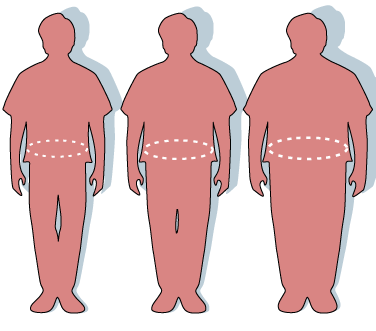AMA Recognizes Obesity As Disease: One-Third Of Americans Could Potentially Be Defined As Ill

The American Medical Association (AMA) voted to recognize obesity as a disease on Tuesday at the organization's annual meeting in Chicago, overriding a recommendation against doing so.
According to The New York Times, recognizing obesity as a disease rather than a risk factor for other diseases could encourage doctors to pay more attention to treating overweight patients and also get insurers to pay for treatment.
"Recognizing obesity as a disease will help change the way the medical community tackles this complex issue that affects approximately one in three Americans," said Dr. Patrice Harris, an AMA board member, in a statement.
The AMA's new classification does not technically have any legal effect, but legislators tend to look to professional organizations for recommendations in making major policy decisions. Lawmakers who are not well versed in the risks of and treatments for various ailments oftentimes rely on the AMA's stances when medical policy and health regulations are made.
Obesity is a rapidly growing problem in the U.S. Self-reported obesity is higher in the U.S. than in any other country that is a member of the Organization for Economic Co-operation and Development (OECD). The obesity rate was 28.5 percent in 2011, and an obese individual will cost the health care system an estimated 25 percent more than a person at healthy weight.
But not all of the AMA's delegates were on board for the changed recognition of obesity. "BMI is a very imperfect measure," said Dr. Robert Gilchick, an AMA delegate who is also director of Child and Adolescent Health Program and Policy with the Los Angeles County Department of Public Health.
Body mass index (BMI) is a number calculated from a person's height and weight to identify potential weight problems. It has been criticized in the past for being physiologically wrong, suggesting that there is an "ideal weight," and too heavily relied on by doctors. But, according to the Centers for Disease Control and Prevention, "BMI is a fairly reliable indicator of body fatness for most people."
The debate about whether obesity should be called a disease has gone on for years. In 2008, The Obesity Society issued a paper in which it expressed support for classifying obesity as a disease. The IRS allows treatment for obesity to qualify as a tax deduction. And, although Medicare does not formally recognize obesity as a disease, it did remove language from its coverage manual that said the condition was not a disease.
Perhaps the biggest takeaway from this new classification is this: one-third of Americans could now be defined as "ill." And while some believe that this could lead to a slippery slope of over-treatment — in the form of drugs and surgery in lieu of exercise and diet changes — obesity advocates say that this is a positive step in the right direction.
"I think you will probably see from this physicians taking obesity more seriously, counseling their patients about it," said Morgan Downey, an advocate for obese people and publisher of the online Downey Obesity Report. "Companies marketing the products will be able to take this to physicians and point to it and say, 'Look, the mother ship has now recognized obesity as a disease.'"
Published by Medicaldaily.com



























